Events and Activities
DIJ Alumni Meeting at VSJF Conference in Berlin
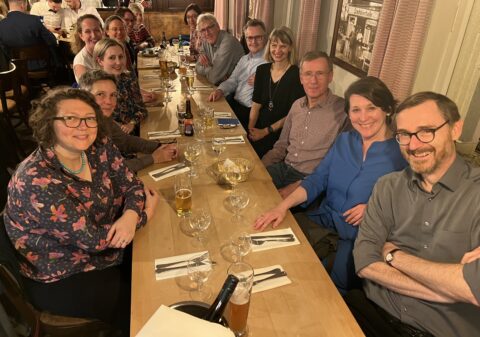
During this year’s annual conference of the German Association for Social Science Research on Japan (VSFJ) in Berlin, 14 current and former DIJ employees met for an alumni dinner. The photo shows (from left to right): Cosima Wagner, Isa Ducke, Elisabeth Köller, Ruth Achenbach, Michaela Oberwinkler, Gabriele Vogt, Ursula Flache, Momoyo Hüstebeck, Helmut Demes, Harald Conrad, Barbara Holthus, Hanns Günther Hilpert, Phoebe Holdgrün, and Axel Klein. At the conference’s sections meetings, several DIJ researchers and alumni gave research presentations, including current deputy director Barbara Holthus on animal abuse and PhD student Jasmin Rückert on photo albums of Japanese soldiers as well as alumni Michaela Oberwinkler (Düsseldorf) on emoji in digital communication, Steve R. Entrich (Duisburg-Essen) on effects of transnational experiences on the Japanese labour market, and Carola Hommerich (Sophia University) on changing attitudes towards environmental problems and climate change.
Online Study Group on Religion in Japan’s Cultural Heritage Campaign

As part of the nationwide campaign “Japan Cultural Heritage”, the religious tradition Shugendō has been listed as cultural heritage by the Japanese Agency for Cultural Affairs. Ever since, this label has been used to promote the tourist marketing of one of the main areas of Shugendō practice in Wakayama. Practicing groups across the country are also gathering in digital social networks, creating new structures and collaborating with international groups practicing outside of Japan. Shugendō is thereby involved in debates about the environment and sustainability, national identity and, of course, cultural heritage. This lecture explores how practitioners of this religious tradition and external sectors are related to each other and how religion influences socioeconomics and the imagination of “culture”. Latest field research by the speaker provides insights into the cultural heritage campaign and the role Shugendō plays regarding the Expo 2025 in Osaka. Details and registration here
Josko Kozic, Heidelberg University/DIJ Tokyo
New issue of Contemporary Japan with ‘Gender, Family and Work’ special section
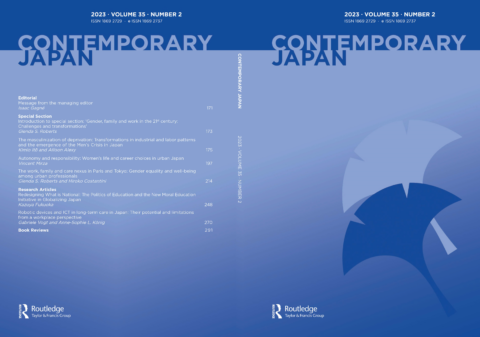 We have just published a new issue of Contemporary Japan (vol. 35, no. 2), containing a special section on “Gender, Family and Work in the 21st Century: Challenges and Transformations”, guest edited by Glenda S. Roberts. The special section includes articles on the masculinization of deprivation by Kimio Itō & Allison Alexy, on women’s life and career choices in urban Japan by Vincent Mirza, and on gender equality and well-being among urban professionals in Paris and Tokyo by Glenda S. Roberts & Hiroko Costantini. This issue also contains two research articles on the politics of education by Kazuya Fukuoka and on robotic devices and ICT in long-term care by Gabriele Vogt and Anne-Sophie L. König. Rounding out the issue, our book review section covers three English language publications on urban migrants in rural Japan, on education and social justice, and on censorship in Japan. Please see the full issue here
We have just published a new issue of Contemporary Japan (vol. 35, no. 2), containing a special section on “Gender, Family and Work in the 21st Century: Challenges and Transformations”, guest edited by Glenda S. Roberts. The special section includes articles on the masculinization of deprivation by Kimio Itō & Allison Alexy, on women’s life and career choices in urban Japan by Vincent Mirza, and on gender equality and well-being among urban professionals in Paris and Tokyo by Glenda S. Roberts & Hiroko Costantini. This issue also contains two research articles on the politics of education by Kazuya Fukuoka and on robotic devices and ICT in long-term care by Gabriele Vogt and Anne-Sophie L. König. Rounding out the issue, our book review section covers three English language publications on urban migrants in rural Japan, on education and social justice, and on censorship in Japan. Please see the full issue here
Online DIJ Study Group on Japan’s Economic Security Policy
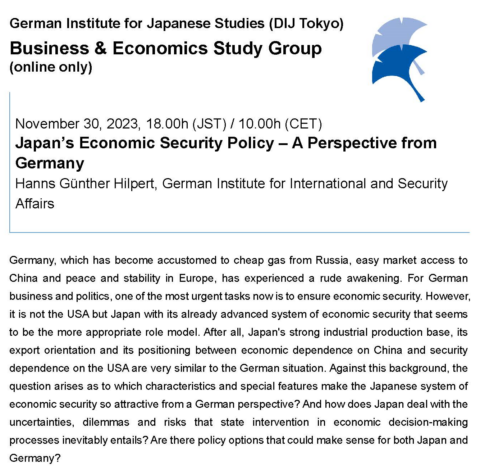 Germany, which has become accustomed to cheap gas from Russia, easy market access to China and peace and stability in Europe, has experienced a rude awakening. One of the most urgent tasks now is to ensure economic security. However, it is not the USA but Japan with its advanced system of economic security that seems to be the more appropriate role model. After all, Japan’s strong industrial production base, its export orientation and its positioning between economic dependence on China and security dependence on the USA are very similar to Germany’s situation. Against this background, the question arises as to which characteristics make the Japanese system of economic security so attractive from a German perspective? And how does Japan deal with the uncertainties, dilemmas and risks that state intervention in economic decision-making processes inevitably entails? Details and registration here
Germany, which has become accustomed to cheap gas from Russia, easy market access to China and peace and stability in Europe, has experienced a rude awakening. One of the most urgent tasks now is to ensure economic security. However, it is not the USA but Japan with its advanced system of economic security that seems to be the more appropriate role model. After all, Japan’s strong industrial production base, its export orientation and its positioning between economic dependence on China and security dependence on the USA are very similar to Germany’s situation. Against this background, the question arises as to which characteristics make the Japanese system of economic security so attractive from a German perspective? And how does Japan deal with the uncertainties, dilemmas and risks that state intervention in economic decision-making processes inevitably entails? Details and registration here
Hanns Günther Hilpert, German Institute for International and Security Affairs
Hybrid DIJ Study Group on National Identity Discourses in Japan

The Rugby World Cup held in Japan in 2019 was an intriguing example of a large-scale international sporting event that triggered national identity discourses. A multi-ethnic team which represented Japan with outstanding success, Japan’s national rugby team’s journey through the tournament was broadly covered in the media and the team was cheered on by fans across the country. Yet, the myth of mono-ethnicity still resonates with some segments in Japanese society. The resulting tension is brought into focus by intensive media reporting and can ultimately lead to a process of redefining a nation-state’s self-perception. This presentation will discuss the tensions between the assumed mono-ethnicity and the reality of a changing society. How does this discourse of national belonging in Japan take place? What is considered diverse in Japan and where do national and international reporting clash regarding Japanese national identity? Details and registration here
Jane Khanizadeh, LMU Munich/DIJ Tokyo
Isaac Gagné and Celia Spoden to give research presentations at the AAA Conference

DIJ researchers Isaac Gagné and Celia Spoden will attend this year’s annual meeting of the American Anthropological Association (AAA) in Toronto to present their latest research. Both will give presentations in the panel “Beyond ‘Lonely Death’: Communication and Engagement in Japan’s Aging Society” on November 17. Drawing from fieldwork in a hamlet in Nagano and the displaced district of Yuriage in Miyagi, Isaac’s paper (“Social Welfare of and for the Community: Neighborhoods, Networks, and Volunteerism in Aging Japan”) will discuss the roles of community-based social welfare services in aging suburban and rural communities. In her paper (“Cyber-Physical Spaces in Japan: Social Inclusion of People with Disabilities Through Avatar-Work”), Celia will present her fieldwork in an avatar café, where home-bound people remotely control robots and serve the guests. Drawing on interviews with the avatar pilots, she will explore their perception of social participation, work, and disability.
DIJ Newsletter Autumn 2023
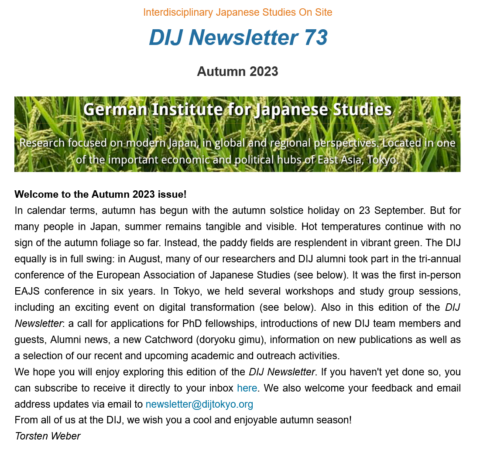
The autumn issue of our DIJ Newsletter includes introductions of new DIJ team members and guests, Alumni news, a new Catchword (doryoku gimu), a call for applications for PhD fellowships, information on new publications as well as a selection of our recent and upcoming academic and outreach activities. We hope you will enjoy exploring this new edition of the DIJ Newsletter. If you haven’t done so yet, you can subscribe to receive our Newsletters directly to your inbox. The full issues and subscription form are available here.
Japan-Stipendien für Promovierende
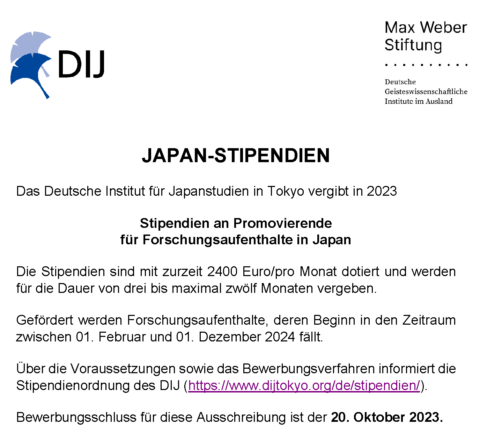 Für das Jahr 2024 vergibt das DIJ wieder attraktive Stipendien zur Förderung von Forschungsaufenthalten in Japan im Rahmen von Promotionsvorhaben. Die Stipendien sind mit zurzeit 2400 Euro/Monat dotiert und werden für die Dauer von drei bis maximal zwölf Monaten vergeben. Gefördert werden Forschungsaufenthalte, deren Beginn in den Zeitraum zwischen 1. Februar und 1. Dezember 2024 fällt. Über die Voraussetzungen sowie das Bewerbungsverfahren informiert unsere Stipendienordnung. Bewerbungsschluss für diese Ausschreibung ist der 20. Oktober 2023.
Für das Jahr 2024 vergibt das DIJ wieder attraktive Stipendien zur Förderung von Forschungsaufenthalten in Japan im Rahmen von Promotionsvorhaben. Die Stipendien sind mit zurzeit 2400 Euro/Monat dotiert und werden für die Dauer von drei bis maximal zwölf Monaten vergeben. Gefördert werden Forschungsaufenthalte, deren Beginn in den Zeitraum zwischen 1. Februar und 1. Dezember 2024 fällt. Über die Voraussetzungen sowie das Bewerbungsverfahren informiert unsere Stipendienordnung. Bewerbungsschluss für diese Ausschreibung ist der 20. Oktober 2023.





 Open Access
Open Access
